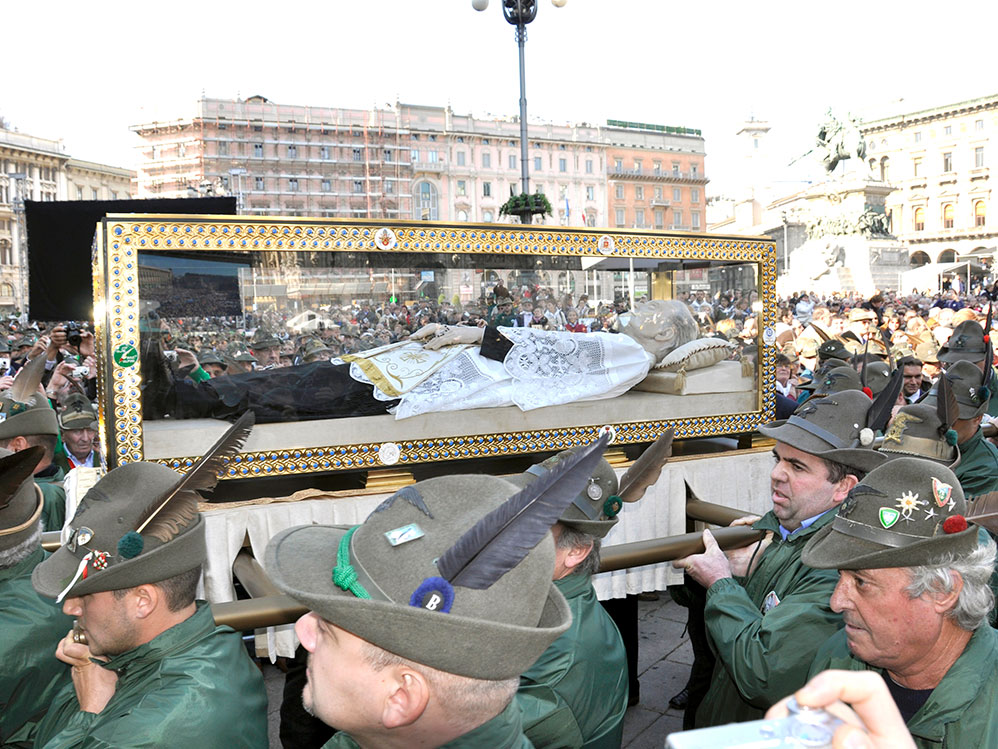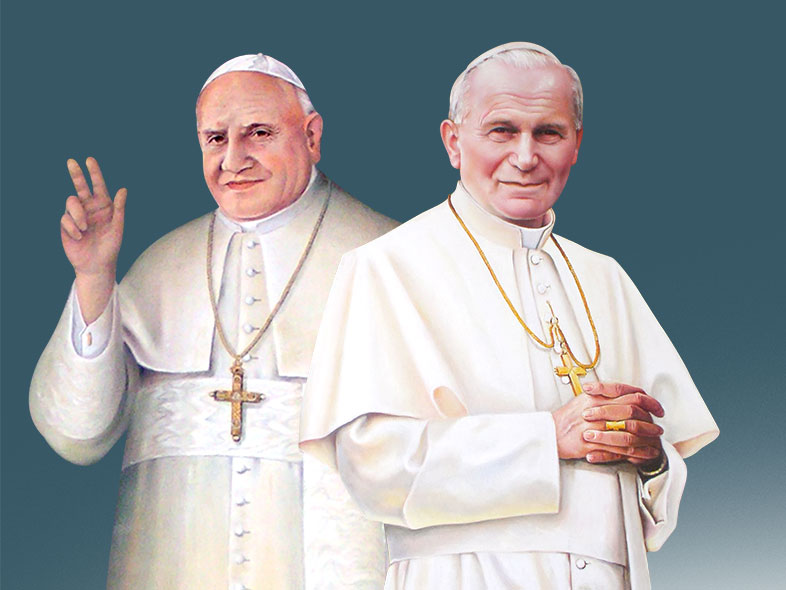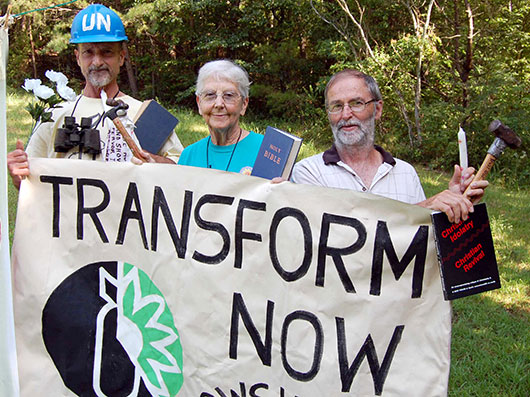There were many consoling, inspiring, uplifting moments on October 26, 2007 in Linz, Austria at the beatification of the anti-war hero Franz Jägerstätter: the resounding applause for his 94-year-old widow Franziska; the reading of the declaration; the unfurling of the 30-foot banner with Franz’s photo and the sight of dozens of bishops and cardinals standing up, looking up – at last! – to Franz. But the most moving was the presentation of his relics. Franziska kissed them, gave them to a cardinal for the cathedral in Linz, then wept. She knew it. Franz no longer belonged to Austria. From now on, he belonged to the world. And his work was just beginning.
This celebration, for me, was one of the best events in the institutional Church in recent decades, and one of its most political, daring and hopeful. If the institutional Church now says Franz was right, then Ratzinger was wrong, nearly all the Catholics of Austria and Germany were wrong, and the Church has the potential to wake up and return to the Gospel nonviolence of its ancient history. Franz is still a force of controversy throughout Austria, but he is the closest saint in recent centuries to resemble those daring, early Christians. This is exactly what we need: saints who inspire us to follow the nonviolent Jesus, say “no” to war, resist the culture of war, speak out for peace, work for justice, and combine the full mystical and political dimensions of faith.
The witness of Franz Jägerstätter has been at the heart of my own journey. My grandmother gave me a booklet about Franz while I was at Duke University, trying to decide what to do with my life. I was stunned by this story of a young father, husband, and farmer, born on May 20, 1907, who was called into active service by the Nazis in February, 1943, politely refused, was imprisoned in Linz, condemned to death for “undermining military morale,” and beheaded on August 9, 1943. His witness encouraged me to become a Jesuit and an advocate for peace, justice and nonviolence. “Consider two things: from where, to where,” Franz wrote his godson from prison, just a few weeks before his execution. “Then your life will have its true meaning.” I’ve been trying to take his good advice.
A train going to hell
In 1985, I read Gordon Zahn’s ground-breaking biography, “In Solitary Witness,” while living in a refugee camp in El Salvador. In the 1990s, I made a pilgrimage to St. Radegund to pray at Franz’ grave and visit Franziska and the Jägerstätters. In 2007, it was a joy and a blessing to embrace her and her family again. On the night before the celebration, nearly a hundred Pax Christi members from Austria, England and the U.S. gathered for a meal and reflections on Franz’s life. The two-hour Mass was broadcast live on national TV in Austria and Germany. Afterwards, our Pax Christi contingent processed through the streets of Linz, stopping first at the bishops’ house where Franz went for counsel only to be told to fight for Hitler. (It was there, Franziska says, that he emerged from the building feeling very sad and said, “They don’t dare themselves, or it’ll be their turn next.”) Then we stood in the courtyard of the building which the Nazis turned into a prison, where he was held a few months before being transferred to Berlin. (His cell, on the second floor overlooking the courtyard, is now a business office.) Then we crossed the Danube, took a tram up the mountain to a church overlooking the city and the Alps, and enjoyed a special lunch. Later, many attended the new opera written about Franz, and celebrated a feast in honor of Franz and Franziska hosted by the governor. A holy day to remember!
Throughout the pilgrimage, I reflected on the famous dream Franz had, which pushed him to say “no” to war. In 1938, he dreamt of a beautiful train and huge crowds rushing to board it. Then he heard a voice saying, “This train is going to hell!” Next, he saw a vision of many people suffering. He awoke terrified and told Franziska, then later wrote about it from prison. The dream, he wrote, was about Nazi patriotism, idolatry and war making.
We are losing our souls
But I wonder if his nightmare was about all patriotism, idolatry and warmaking, our global rush to violence, killing, war and nuclear weapons. His dream describes our quiet, steady support for American imperialism, military domination, war against Iraq and Afghanistan, corporate greed, environmental destruction, and ignoring the cry of the world’s poor. Franz wrote fiercely about the loss of our soul. We are losing our souls and we don’t know it, he said. “I would like to call out to everyone who is riding on this train: ‘Jump out before this train reaches its destination, even if it costs you your life!’”
That is what many of us are saying. Like Franz, we’re trying not to get on the train to hell, even though crowds rush to board it, and we’re crying out, “Don’t get on this train. Don’t support the culture of war. Don’t make nuclear weapons at Los Alamos. Don’t spend your life becoming rich while a billion starve. Don’t worship the flag of empire. Become a conscientious objector, a nonviolent resister, a public peacemaker, a Christian.”
But what astonishes me most is that Franz didn’t just reason his way to oppose an unjust war (which is what most good people conclude about him; he realized that Nazi warfare was unjust, so he refused to fight, and did the right thing). I believe Franz went much farther. With Franziska, he climbed the heights of faith, the kind that moves mountains. “He prayed all day long,” one of his cellmates testified. He received daily communion, gave to those in need, spoke out as necessary, tried to teach his priests and bishops, prepared for death and tried to do all things for the honor of God. He became a person of deep mystical prayer, and made the connection between Gospel politics and Gospel spirituality. By the time of his death, I submit, Franz understood that to follow the nonviolent Jesus and give one’s entire life to God meant that you could never kill, support war, or compromise with evil.
We need spiritual weapons
“Just as those who believe in Nazism tell themselves that their struggle is for survival,” he wrote from prison, “so must we, too, convince ourselves that our struggle is for the eternal Kingdom. But with this difference: we need no rifles or pistols for our battle but, instead, spiritual weapons… Let us love our enemies, bless those who curse us, pray for those who persecute us. For love will conquer and will endure for all eternity. And happy are they who live and die in God’s love.”
On the morning of his death, Father Albert Jochmann, the pastor of Brandenburg, visited Franz in his cell, brought him communion and heard his confession. He also offered a Bible. “I am completely united with God and any reading would disrupt my union with God,” Franz said to the priest’s amazement. That day, he wrote to Franziska in his last letter, “The Heart of Jesus, the Heart of Mary and my heart are one, united for time and eternity.”
Who dares say such a thing? The collection of letters of Mother Teresa, which I read on the plane to Austria, testifies clearly that she never felt such union with God. Few do. Franz did. It was the natural culmination of his steadfast, wholehearted pursuit of God and God’s reign of peace, which required both nonviolent resistance to idolatry, empire and war, and full-time devotion to prayer, worship and nonviolent love. As the world’s violence worsens, I think Franz will emerge as one of history’s greatest saints.
Richer than millionaires
Franz never gave up on the Church, even though every single priest, pastor, chaplain and bishop he knew advised him to fight for the Nazis, for the sake of his wife and children. He held his ground, felt sad, and prayed for them. On the day of his execution, Father Jochmann told Franz about an Austrian priest, Fr. Franz Reinisch, who had recently been executed for refusing to fight. This report consoled Franz a great deal. (Now we know that some 4,000 priests were killed by the Nazis.) Like Franz, we have to reach out and convert every priest, pastor, bishop and cardinal who supports war, nuclear weapons, and patriotic imperialism to the Gospel wisdom of active love, nonviolent resistance and steadfast peacemaking.
Because Franz Jägerstätter broke new ground, we do not have to do this work alone. Yes, we may be harassed, even arrested and imprisoned, but unlike Franz, we will not be alone. We can join and form communities of peace and justice to help each other take a stand for peace, support one another, and speak out in one voice against our nation’s wars and injustices. Together, like Franz, we can help one another plumb the mystical depths of Gospel nonviolence until we, too, are completely united with Jesus, Mary and the God of peace.
“We must do everything in our power to strive toward the eternal homeland and to preserve a good conscience,” Franz wrote from prison. “Though we must bear our daily sorrows and reap little reward in this world for doing so, we can still become richer than millionaires – for those who need not fear death are the richest and happiest of all. And these riches are there for the asking.” “There have always been heroes and martyrs who gave their lives for Christ and their faith. If we hope to reach our goal someday, then we, too, must become heroes of the faith.”
We must obey God
“If one harbors no thought of vengeance against others and can forgive everyone,” he wrote, “he will be at peace in his heart – and what is there in all this world more lovely than peace? Let us pray to God that a real and lasting peace may soon descend upon this world.”
“The crucial lesson to be learned,” Gordon Zahn declared, “is that, however hopeless the situation or seemingly futile the effort, the Christian need not despair. Instead, he can and should be prepared to accept and assert moral responsibility for his actions. It is always possible, as Jagerstatter wrote, to save one’s own soul and perhaps some others as well by bearing individual witness against evil.”
“Through his bitter suffering and death,” Franz wrote, “Christ freed us only from eternal death, not from temporal suffering and mortal death. But Christ, too, demands a public confession of our faith, just as the Fuhrer, Adolf Hitler, does from his followers. The commandments of God teach us, of course, that we must render obedience to secular rulers. But only to the extent that they do not order us to do anything evil, for we must obey God rather than men.”
“A prophet with a global view and a penetrating insight.” “A shining example in his fidelity to the claims of his conscience.” “An advocate of nonviolence and peace, a voice of warning against ideologies, a deep-believing person for whom God really was the core and center of life.” This is how the Bishop of Linz described our Blessed Franz.
Let’s hope and pray for more saints, prophets and martyrs like Franz, and try our best to emulate him.
*Edited version of “Blessed Franz Jägerstätter,” a text available in www.fatherjohndear.org/…/blessed_franz_jagerstatter.html







